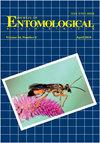植物性生物农药对绝对白腹大蠊的杀卵、杀幼虫效果研究
IF 0.7
4区 农林科学
Q4 ENTOMOLOGY
引用次数: 0
摘要
摘要番茄叶螨(Tuta absoluta Meyrick)是一种全球性的番茄(Solanum lycopersicum L.)入侵害虫,于2010年传入西非。合成杀虫剂仍然是最广泛使用的防治方法,但正在开发几种生物替代品。在这项工作中,我们评估了西非市场上可获得的九种生物农药对绝对白僵虫的控制能力。采用标准的叶浸或卵浸生物测定方法,比较了这些生物农药在不同浓度的有效成分下的杀卵活性和杀幼虫活性。结果表明,不同生物农药的幼虫致死浓度(LC) (8.2 ~ 41.14 ml/L)均低于阻止卵孵化所需的致死浓度(26.7 ~ 409.7 ml/L)。两个产品(bang - ki本文章由计算机程序翻译,如有差异,请以英文原文为准。
Ovicidal and Larvicidal Effects of Selected Plant-Based Biopesticides on Tuta absoluta (Lepidoptera: Gelechiidae)
Abstract The tomato leafminer, Tuta absoluta Meyrick (Lepidoptera: Gelechiidae), is a worldwide invasive pest of tomatoes (Solanum lycopersicum L.) that reached West Africa in 2010. Synthetic insecticides remain the most widely used method of control, but several biological alternatives are being developed. In this work, we evaluated nine biopesticides available on the West African market for their ability to control T. absoluta. Using standard leaf or egg dip bioassay methodology, we compared both the ovicidal and the larvicidal activity of these biopesticides at various concentrations of active ingredients. We found that, for each biopesticide tested, the larval lethal concentrations (LC) (8.2–41.14 ml/L) to be lower than those necessary to stop egg hatching (26.7–409.7 ml/L). Two products (Bangr-Kièta [BK]; Bangr-Pougo [BP], formulated in powder), both based on Azadirachta indica A. Jussieu fruit and leaf extracts and Khaya senegalensis (Desrousseaux) A. Jussieu bark extract, showed high efficacy in reducing egg hatchability at their recommended doses, with a calculated control failure likelihood (CFL) reaching 0%. These two products, together with a third one (BP) based on Mitracarpus scaber Zuccarini and K. senegalensis extracts, also showed the strongest larvicidal effects (CFL = 0%). All other tested biological insecticides showed significant efficiency but were found to be less effective at their recommended doses. Because the leafminer has developed resistance to most of the synthetic insecticide available on the market, we recommend that West African tomato producers are encouraged to use the most efficient biological products available.
求助全文
通过发布文献求助,成功后即可免费获取论文全文。
去求助
来源期刊
CiteScore
1.20
自引率
11.10%
发文量
40
审稿时长
>12 weeks
期刊介绍:
The Journal of Entomological Science (ISSN 0749-8004) is a peer-reviewed, scholarly journal that is published quarterly (January, April, July, and October) under the auspices of the Georgia Entomological Society in concert with Allen Press (Lawrence, Kansas). Manuscripts deemed acceptable for publication in the Journal report original research with insects and related arthropods or literature reviews offering foundations to innovative directions in entomological research

 求助内容:
求助内容: 应助结果提醒方式:
应助结果提醒方式:


